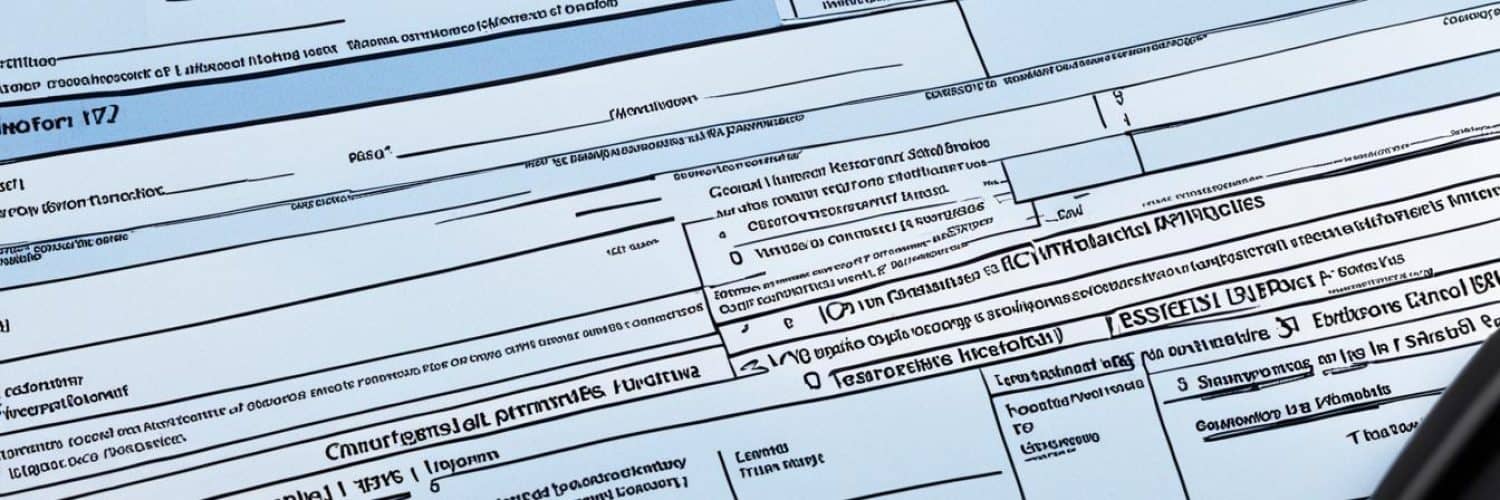Are you feeling overwhelmed by the complexities of the visa process? Are you unsure about how to expedite your visa petition and ensure a smooth transition? Look no further. In this comprehensive guide, we will simplify the visa process for you and provide you with the essential information you need to navigate the I129 form and streamline your visa application.
Whether you’re seeking to switch employers or extend your work visa, understanding the specific requirements and knowing how to navigate the petition process is crucial. From understanding your visa type to navigating layoffs and job loss, we’ve got you covered. We’ll also provide insights into international travel considerations and the I Visa application process.
Key Takeaways:
- Understand the specific requirements of your visa type to ensure a successful transition.
- Familiarize yourself with the process of switching employers on a work visa to avoid complications.
- Consult with an immigration attorney to navigate international travel during the transition period.
- Act promptly and explore options during a job loss to minimize disruptions to your employment status.
- Work with an experienced immigration law firm to simplify the I Visa application process.
Understanding Your Visa Type
Before diving into the process of switching employers or extending your work visa, it is crucial to understand the specifics of your current visa. Different visa categories have distinct rules and regulations for employment terms and the relationship with your sponsoring employer. Familiarizing yourself with the requirements and restrictions of your visa category will help ensure a successful transition to a new employer.
When it comes to work visas, each visa category has its own set of eligibility criteria and specific conditions that must be met. By understanding the details of your visa type, you can navigate the process more efficiently and avoid any complications that may arise during the transition.
Let’s take a closer look at some common work visa categories and their key characteristics:
- H-1B Visa: This visa is widely sought after by professionals in specialty occupations. It requires sponsorship from a U.S. employer and is subject to an annual cap. Eligibility for the H-1B visa includes having a bachelor’s degree or higher and a job offer from a U.S. employer in a qualifying occupation.
- L-1 Visa: The L-1 visa is designed for intra-company transferees. It allows multinational companies to transfer their employees from a foreign branch to a U.S. branch. To be eligible for an L-1 visa, applicants must have been employed by the company for at least one year and be coming to the U.S. to work in an executive, managerial, or specialized knowledge capacity.
- E-2 Visa: The E-2 visa is available to individuals from countries that have a treaty of commerce and navigation with the United States. It allows investors and entrepreneurs to work in the U.S. based on substantial investments made in a U.S. business. Applicants must demonstrate that the investment is substantial and that they will develop and direct the U.S. enterprise.
These are just a few examples of the many work visa categories available. Each visa category has its own set of requirements and benefits, so it’s important to thoroughly research and understand the details of your specific visa type.
Switching Employers on a Work Visa
Switching employers on a work visa can be a complex process that requires careful consideration and adherence to specific legal requirements. It’s important to understand that not all work visas permit a straightforward transfer between employers. For example, if you currently hold an H-1B visa, switching employers will involve your new employer filing a new Form I-129 (Petition for Nonimmigrant Worker) on your behalf.
Before attempting to change employers on your work visa, it’s crucial to ensure that your visa category allows for such a change. Additionally, you must meet the eligibility criteria set by U.S. Citizenship and Immigration Services (USCIS) to successfully transfer your work visa.
The H-1B visa is one of the most common work visas that require a new Form I-129 for a change of employer. The H-1B visa is designed for foreign workers in specialty occupations, and the new employer must file the Form I-129 to initiate the transfer process. This form serves as a petition to USCIS, outlining the details of the job offer and the foreign worker’s qualifications.
âSwitching employers on a work visa requires understanding the specific requirements of your visa category and ensuring that you meet all eligibility criteria set by USCIS.â
By filing the Form I-129, the new employer is essentially requesting USCIS to transfer the work visa sponsorship from the current employer to them. USCIS will review the petition, ensuring that it complies with all necessary regulations and that the foreign worker meets the requirements for the visa category. It’s important to note that the process of switching employers on a work visa can take time, and it’s essential to maintain lawful status and continue working for your current employer until the new petition is approved.
For a smooth transition, it is advisable to consult with an experienced immigration attorney who can guide you through the process and ensure all requirements are met. They can assist in preparing the necessary documentation, including the Form I-129, and provide guidance on meeting USCIS eligibility criteria.
Understanding the H-1B Visa Transfer Process
When switching employers on an H-1B visa, there are several steps involved:
- Obtain a job offer from a new employer: Before initiating the transfer process, you must secure a formal job offer from a new employer who is willing to sponsor your H-1B visa.
- File a new Form I-129: The new employer will file a new Form I-129 with USCIS on your behalf. The form should include comprehensive details about the job offer, your qualifications, and any other required documentation.
- Wait for approval: USCIS will review the new Form I-129 and make a decision on the transfer petition. This process can take several weeks or even months, so it’s important to plan accordingly.
- Maintain lawful status: While waiting for the petition to be approved, it’s crucial to maintain your lawful status by continuing to work for your current employer and ensuring compliance with all visa requirements.
- Commence employment with the new employer: Once the transfer petition is approved, you can legally commence employment with your new employer. It’s essential to notify your current employer about the change in employment.
Switching employers on a work visa, such as the H-1B visa, requires careful planning and attention to detail. By following the proper procedures and seeking professional guidance, you can navigate the process smoothly and ensure a successful transition to your new employer.
The Process of Switching Employers on a Work Visa
Switching employers on a work visa involves a series of steps to ensure a seamless transition from your current position to a new job opportunity. It begins with securing a formal job offer from a prospective employer who is willing to sponsor your visa. This job offer is crucial as it demonstrates your commitment to the new employer and proves that the new position aligns with the terms of your existing visa.
Your new employer will play a vital role in the process by actively participating in the petition filing. They will be responsible for submitting the necessary documents, such as a new Labor Condition Application (LCA) and a new Form I-129, to the U.S. Citizenship and Immigration Services (USCIS) on your behalf. These documents are essential for the approval of your visa transfer.
During the transition period, it is important to maintain your lawful status by continuing to work for your current employer until the new petition is received and approved by USCIS. This ensures that you maintain your legal status and prevents any disruptions in your employment authorization.
Overall, the process of switching employers on a work visa requires collaboration between you, your new employer, and the immigration authorities. By following the necessary steps and fulfilling the requirements, you can successfully make the transition to a new job while maintaining your status as a nonimmigrant worker.

| Visa Type | Job Offer Requirements |
|---|---|
| H-1B Visa | Requires a new Form I-129 and new Labor Condition Application (LCA) from the new employer |
| L-1 Visa | Requires a job offer from a qualifying parent, branch, subsidiary, or affiliate company |
| O-1 Visa | Requires a job offer from an employer who can demonstrate extraordinary ability or achievement in the field |
International Travel Considerations
If you have international travel plans during the transition, it is advisable to consult with an immigration attorney to understand the implications on your pending petition. Traveling while a petition is pending with USCIS can complicate the process, and re-entry may be subject to visa approval. An immigration attorney can provide guidance and ensure a smooth transition during your travels.
Why Consult an Immigration Attorney?
During the transition period, traveling internationally can have significant implications on your pending petition. It is crucial to consult with an immigration attorney to navigate potential challenges and ensure a seamless transition. Here’s why:
- Knowledge and Expertise: Immigration attorneys are well-versed in the complex laws and regulations surrounding visa applications and approval processes. They can provide accurate guidance tailored to your specific situation.
- Optimizing Your Petition: An immigration attorney will review your petition to identify any potential issues or deficiencies that could affect the approval process. They will assist you in gathering and organizing the necessary documentation to strengthen your case.
- Understanding Travel Implications: Traveling while your petition is pending can complicate your visa application process. An immigration attorney will explain the potential consequences of traveling, including the risk of delays, complications, or denial of re-entry.
- Streamlining the Process: With their expertise, an immigration attorney can guide you through the complexities of the immigration procedures, ensuring that your transition and travel plans align with the requirements set by USCIS.
Traveling while a petition is pending with USCIS can complicate the process, and re-entry may be subject to visa approval.
Ensuring a Smooth Transition
By consulting with an immigration attorney, you can mitigate the risks associated with international travel during the transition and ensure a smooth journey. The attorney will provide valuable guidance on:
- Understanding Visa Restrictions: An immigration attorney will inform you of any travel restrictions or limitations imposed by your visa category. They will ensure that your travel plans comply with the requirements to maintain your lawful status.
- Appropriate Timing: Timing is crucial when planning international travel during the petition process. An immigration attorney will advise you on the optimal time to travel to minimize disruptions and maximize the chances of a successful visa approval.
- Preparing for Visa Interviews: If your travel involves a visa interview at a U.S. consulate or embassy, an immigration attorney can assist in preparing you for the interview, offering valuable insights and guidance to enhance your chances of a successful outcome.
Seeking the guidance of an immigration attorney will provide peace of mind and ensure that you have considered all the necessary factors when planning your international travel during the transition period.
| Benefits of Consulting an Immigration Attorney |
|---|
| Expert knowledge of immigration laws and regulations |
| Efficient organization and optimization of your petition |
| Accurate understanding of travel implications on your pending petition |
| Guidance tailored to your specific situation |
| Streamlining the immigration process and ensuring compliance with USCIS requirements |
Consulting an immigration attorney can make all the difference in ensuring a smooth travel experience while your petition is pending. Their knowledge, expertise, and guidance will assist in optimizing your chances of visa approval and a successful transition.
Navigating Layoffs and Job Loss
In the unfortunate event of a job loss while on a work visa, it can be a challenging and uncertain time. However, there are options available to help you navigate this situation and minimize disruptions to your employment status.
One important consideration is the 60-day grace period that allows you to find a new employer and initiate the process of filing a petition for a new position. This grace period provides you with valuable time to search for a new job and explore opportunities that align with your skills and career aspirations.
During this grace period, it is crucial to act promptly and take proactive steps to secure a new employer. Networking, updating your resume, and reaching out to potential employers can increase your chances of finding a new job within the designated timeframe.
Keep in mind that finding a new employer during the grace period is essential for maintaining your legal status in the United States. Failure to secure new employment within the 60-day timeframe may result in a violation of your visa conditions.
While seeking a new job, it is essential to stay informed about the latest immigration regulations and requirements. Consulting with an immigration attorney can provide you with valuable guidance and ensure that you remain compliant with the necessary procedures.
Lastly, maintaining a positive outlook and utilizing available resources can greatly assist you in finding a new employer. Job boards, professional networks, and career counseling services can connect you with potential employers and assist you throughout the job search process.
Resources to Assist in Finding a New Employer
| Resource | Description |
|---|---|
| Job boards | Online platforms where employers post job openings. Examples include Indeed, LinkedIn, and Glassdoor. |
| Professional networks | Networking platforms such as LinkedIn and industry-specific associations that connect professionals with potential employers. |
| Career counseling services | Organizations that provide guidance, resume writing assistance, and job search support to individuals seeking employment. |
| Immigration attorneys | Legal professionals specializing in immigration law who can provide guidance and ensure compliance with visa regulations. |
H-1B Visa Cap Exemption
One benefit of transferring employers on an H-1B visa is that you will not be subject to the annual H-1B cap. If you have already been selected in a previous H-1B visa lottery, you will not need to go through the lottery again when switching employers. This exemption streamlines the process and eliminates the uncertainty of the lottery system.

The H-1B visa is one of the most sought-after work visas in the United States, but the annual cap on the number of visas granted can be a significant hurdle for many applicants. However, when it comes to transferring employers on an H-1B visa, there is good news â you are exempt from the annual H-1B cap.
For individuals who have already gone through the H-1B visa lottery and been selected, the transfer process becomes much smoother. You will not have to go through the random selection process again, saving you time and eliminating the uncertainty of whether you will secure an H-1B visa for the year.
By taking advantage of the H-1B visa cap exemption, you can focus on the essentials of transferring employers and ensuring a seamless transition. This exemption provides a valuable opportunity for professionals with an existing H-1B visa to explore new career opportunities without the restriction of the annual visa cap.
| Advantages of H-1B Visa Cap Exemption | Considerations |
|---|---|
|
|
With the H-1B visa cap exemption, professionals have the opportunity to transfer employers without worrying about the annual quota. This exemption simplifies the process and allows individuals to focus on finding the right career move while ensuring compliance with the U.S. immigration regulations.
“The H-1B visa cap exemption provides a sigh of relief for professionals seeking to switch employers. It eliminates the uncertainty of the lottery system and allows them to explore new opportunities without the limitations of the annual cap.”
H-1B Visa Expiration and Extensions
It is important to note that switching employers on an H-1B visa does not automatically extend your visa expiration date. You will still need to go through the H-1B extension process with your new employer when your current H-1B visa is set to expire. Additionally, switching employers on an H-1B visa does not extend the maximum 6-year period of stay allowed under this visa category.
“Switching employers on an H-1B visa does not automatically extend your visa expiration date. You will need to go through the visa extension process.”
If you are considering changing employers on your H-1B visa, you must be aware of the visa expiration date and plan accordingly to avoid any status violations or complications. This means that even if your new employer files a new petition for you, your current H-1B visa will remain valid only until its original expiration date.
If you wish to continue working in the United States beyond the expiration date of your current H-1B visa, it is crucial to initiate the visa extension process with your new employer in a timely manner.
Visa Extension Process
The H-1B visa extension process involves filing a new petition with the U.S. Citizenship and Immigration Services (USCIS) to request an extension of your authorized stay in the United States. Your new employer will be responsible for filing the necessary documentation, including the Form I-129 (Petition for a Nonimmigrant Worker).
During the visa extension process, it is important to demonstrate that you meet the eligibility criteria for the H-1B visa and that your employment with the new employer is in accordance with the visa regulations. This includes providing evidence of a valid job offer, confirming that the position qualifies as a specialty occupation, and meeting prevailing wage requirements.
The USCIS will review your extension petition and make a decision based on the merits of the case. It is crucial to ensure that all required documentation is included and that the petition is prepared accurately to increase the likelihood of a successful extension.
Maximum Period of Stay
It is essential to keep in mind that switching employers on an H-1B visa does not extend the maximum period of stay allowed under this visa category. The H-1B visa is typically granted for a maximum initial period of three years, with the option to extend it for an additional three years, totaling a maximum of six years.
If you have already spent the maximum six years in the United States on an H-1B visa, switching employers will not grant you additional time. In such cases, it may be necessary to explore other visa options or seek legal counsel to determine the best course of action for your specific situation.
Understanding the limitations and requirements associated with H-1B visa expiration and extensions is crucial for individuals considering a job change while on this visa. It is recommended to consult with an immigration attorney or an experienced HR professional to navigate the process smoothly and ensure compliance with all immigration regulations.
The I129 Form Instructions
Completing the Form I129 is a crucial step when employers petition the U.S. Citizenship and Immigration Services (USCIS) for a nonimmigrant worker. To ensure a successful petition process, it is essential to understand the instructions for completing the form, as well as the required documentation and supporting materials.
By following the instructions accurately, you can expedite the processing of your I129 form and increase your chances of approval. Below are key points to keep in mind when completing the form:
- Employer Information: Provide accurate and up-to-date information about your employer, including their name, address, and contact details.
- Beneficiary Information: Include the personal information of the nonimmigrant worker for whom the petition is being filed, such as their full name, date of birth, and passport information.
- Job Position: Clearly state the job position being offered to the nonimmigrant worker and provide a detailed job description.
- Location of Employment: Specify where the nonimmigrant worker will be primarily employed, including the address of the worksite.
- Supporting Documents: Gather and include all required supporting documents, such as the Labor Condition Application (LCA), evidence of the employer’s ability to pay the worker’s salary, and any other relevant documentation.
- Signatures: Ensure that the form is signed and dated by the authorized representative of the employer, as well as the nonimmigrant worker.
By carefully completing the Form I129 and submitting the required documentation, you can streamline the petition process and increase the likelihood of a successful outcome.
Note: It is strongly recommended to consult with an immigration attorney or seek professional assistance when completing the I129 form to ensure accuracy and compliance with immigration regulations.
To have a visual representation of the required documentation for the I129 form, refer to the table below:
| Required Documentation | Description |
|---|---|
| Labor Condition Application (LCA) | A signed and certified document that ensures the employer will pay the nonimmigrant worker the prevailing wage for the specific job position. |
| Evidence of Employer’s Ability to Pay | Financial documents, such as bank statements or audited financial reports, demonstrating the employer’s financial capacity to pay the worker’s salary. |
| Educational Qualifications | Documents supporting the nonimmigrant worker’s educational qualifications, such as diplomas, transcripts, or evaluation letters. |
| Proof of Job Position | Documentation showcasing the need for the specific job position, such as business plans, job postings, or organizational charts. |
| Passport Information | Copy of the nonimmigrant worker’s passport, including the biographical page and any additional pages with relevant visa stamps or entry records. |
| Previous Immigration Documents | Copies of previous immigration documents, such as Form I-797 Approval Notices or Form I-94 Arrival/Departure Records, if applicable. |
Ensure that all required documentation is accurately prepared, organized, and included with your I129 form to avoid delays or potential issues during the petition process.
Eligibility Criteria for the I Visa
The I Visa is specifically designed for representatives of foreign media coming to the United States for work. To be eligible for the I Visa, individuals must meet certain requirements:
- Be involved in informational or news-related events: The primary purpose of the I Visa is to allow individuals to engage in activities that are essential to the foreign media. This may include covering news, reporting on events, or conducting interviews.
- Have a home office in a foreign country: Applicants must have an established home office or a base of operations in a foreign country where their media organization is located.
- Admission must be necessary for work: Individuals must demonstrate that their presence in the United States is necessary for their work and that they cannot effectively carry out their responsibilities from their home country.
Understanding these eligibility criteria is crucial when applying for the I Visa. By meeting these requirements, foreign media representatives can gain entry to the United States and engage in the activities essential to their work.
List of Eligibility Criteria for the I Visa:
| Eligibility Criteria | Description |
|---|---|
| Job involvement | Be involved in informational or news-related events essential to foreign media. |
| Home office | Have a home office in a foreign country where the media organization is based. |
| Necessity for work | Demonstrate that admission to the United States is necessary for work and cannot be effectively carried out from the home country. |
Meeting these criteria is essential for a successful I Visa application. By understanding the requirements and providing the necessary documentation, foreign media representatives can pursue their work in the United States without impediments.
Assisting with the I Visa Application Process
Applying for an I Visa can be overwhelming, but working with an experienced immigration law firm can simplify the process. A knowledgeable immigration lawyer can assist in defining your qualifications, gathering the necessary paperwork, and representing you in any necessary legal interactions. By relying on their expertise, you can navigate the I Visa application process with confidence.
Gathering the necessary paperwork is a crucial step in the I Visa application process. Your immigration lawyer will guide you in identifying and collecting all the required documents, such as:
- Valid passport with an expiration date that extends at least six months beyond your intended stay in the United States
- A completed and signed visa application form
- Passport-sized photographs
- Press ID or other documentation proving your affiliation with a foreign media organization
- An assignment letter from your media organization stating the purpose and duration of your stay in the United States
- Evidence of strong ties to your home country, such as proof of residence, family, or employment
In addition to gathering the necessary paperwork, your immigration lawyer will assist in defining your qualifications for the I Visa. They will carefully review your case and guide you through the eligibility criteria, ensuring that you meet the requirements set by the U.S. Citizenship and Immigration Services (USCIS). Whether you are a journalist, reporter, or working in a related field, their expertise will help in presenting your case in the best possible light.
Moreover, an immigration law firm will represent you in any necessary legal interactions throughout the visa application process. They will communicate with USCIS on your behalf, submit your application, and handle any inquiries or requests for additional documentation. Having a professional advocate for you can alleviate stress and ensure that your application is properly represented.
By working with an immigration law firm, you can streamline the I Visa application process and increase your chances of success. Their knowledge of immigration law and experience with visa applications will ensure that your case is handled professionally and efficiently.
Why Choose an Immigration Law Firm?
âNavigating the complexities of the I Visa application process can be overwhelming. By working with an immigration law firm, you can have peace of mind knowing that you have an experienced team supporting you every step of the way.â
Here are some benefits of choosing an immigration law firm for your I Visa application:
- Expertise: Immigration lawyers specialize in navigating the intricacies of the visa application process. They stay up to date with the latest immigration laws and regulations, ensuring that your application is in compliance with all requirements.
- Personalized guidance: An immigration lawyer will provide personalized guidance tailored to your specific circumstances. They will assess your case, identify any potential challenges, and develop strategies to overcome them.
- Professional advocacy: With an immigration law firm representing you, you can trust that your application will be presented professionally, maximizing your chances of approval. They will handle all communication with USCIS, ensuring that your application is accurately represented.
- Peace of mind: Applying for a visa can be a stressful process, but with an immigration lawyer by your side, you can have peace of mind knowing that you have an experienced advocate fighting for your best interests.
When it comes to the I Visa application process, the assistance of an immigration law firm can make a significant difference in the outcome of your application. By entrusting your case to professionals, you can navigate the process with confidence and increase your chances of a successful visa approval.

Common Challenges in Acquiring the I Visa
Acquiring an I Visa can come with its own set of challenges that applicants need to be aware of. It is important to anticipate and address these challenges to ensure a smooth visa application process.
Insufficient Documentation Support
One common challenge faced by applicants is not having the necessary documentation to support their I Visa application. Aspiring visa holders are required to submit a variety of documents to demonstrate their eligibility. This includes a valid press ID, which serves as proof of their affiliation with a media organization.
Additionally, applicants must provide an assignment letter from their media organization, detailing the purpose and duration of their visit to the United States. These documents are crucial in establishing the applicant’s qualifications and intentions.
Demonstrating Strong Ties to the Home Country
Another challenge is demonstrating substantial ties to their home country. Adjudicating officers closely evaluate an applicant’s ability to prove their intention to return to their home country after the assignment in the United States is completed.
An Example of Required Documentation for the I Visa Application
| Required Documentation | Description |
|---|---|
| Valid Press ID | A press identification card or document issued by a recognized media organization. |
| Assignment Letter | A letter from the media organization specifying the purpose and duration of the assignment in the United States. |
| Passport | A valid passport with at least six months of validity remaining. |
| Completed Visa Application Form | The online Nonimmigrant Visa Application (Form DS-160) completed and submitted. |
| Application Fee Payment Receipt | Evidence of the payment made for the visa application fee. |
| Photograph | A recent color photograph meeting the specific requirements outlined by the U.S. Embassy or Consulate. |
Note: This table provides a general overview of the required documentation for an I Visa application. Applicants should consult the official U.S. Embassy or Consulate website for the most up-to-date and specific requirements.
By ensuring that all necessary documentation is included in the visa application and demonstrating substantial ties to their home country, applicants can increase their chances of a successful I Visa application. Adequate preparation and attention to detail are essential in navigating the challenges that may arise during the process.
Wilner & O'Reilly's Expertise in Handling I Visa Applications
When it comes to navigating the complex world of I Visa applications, you need reliable and experienced immigration lawyers by your side. That’s where Wilner & O’Reilly comes in. With a proven track record of success, they have established themselves as trusted advocates for foreign media professionals seeking to work in the United States.
Wilner & O’Reilly offers a comprehensive range of services to ensure a smooth and successful I Visa application process. Here’s what you can expect when you partner with them:
- In-depth Consultations: The immigration lawyers at Wilner & O’Reilly understand the unique requirements and intricacies of the I Visa application process. They provide personalized consultations to assess your eligibility and guide you through the necessary steps.
- Assistance with Forms: The team at Wilner & O’Reilly will assist you in completing all the necessary forms accurately and efficiently. They understand the importance of attention to detail and ensure that your application is error-free.
- Guidance on Strong Ties: Demonstrating strong ties to your home country is crucial when applying for an I Visa. Wilner & O’Reilly will provide expert guidance on how to effectively present your ties to convince the adjudicating officer of your intention to return at the end of your assignment.
- Preparation for Visa Interview: The visa interview can be a nerve-wracking experience. Wilner & O’Reilly will prepare you thoroughly, equipping you with the knowledge and confidence to navigate the interview successfully.
With Wilner & O’Reilly’s expertise and guidance, you can approach your I Visa application with confidence, knowing that you have a dedicated team of immigration lawyers working tirelessly on your behalf.
Through their years of experience and commitment to excellence, Wilner & O’Reilly has earned a reputation for achieving positive outcomes for their clients. Trust them to handle your I Visa application with professionalism and expertise. Contact Wilner & O’Reilly today to schedule a consultation and embark on your journey to working in the United States as a foreign media professional.
Conclusion
The I Visa is a valuable resource for foreign media professionals seeking work opportunities in the United States. To ensure a successful application, it is crucial to understand the specific visa requirements, navigate the petition process effectively, and gather all necessary documentation.
By partnering with an experienced immigration law firm like Wilner & O’Reilly, you can simplify the I Visa application process and enhance your chances of success. Their expertise and knowledge will guide you through this complex journey, providing you with the support and guidance needed to achieve your career goals in the United States.
Trust Wilner & O’Reilly to handle your I Visa application with care and precision. With their extensive experience and dedication to client success, you can confidently rely on their services to streamline the process and increase your chances of a favorable outcome. Start your journey to visa application success today with Wilner & O’Reilly by your side.
FAQ
What is the I129 form used for?
The I129 form is used by employers to petition the U.S. Citizenship and Immigration Services (USCIS) for a nonimmigrant worker.
How can I expedite the processing of my I129 form?
Following the instructions accurately and including all required documentation and supporting materials can help expedite the processing of your I129 form.
Are there different requirements for switching employers on a work visa?
Yes, different visa categories have distinct rules and regulations for employment terms and changing employers. Familiarizing yourself with the requirements and restrictions of your visa category is crucial for a successful transition.
Can I switch employers on an H-1B visa?
Yes, you can switch employers on an H-1B visa, but the new employer will need to file a new Form I-129 petition on your behalf.
What should I do if I have international travel plans while switching employers?
It is advisable to consult with an immigration attorney to understand the implications on your pending petition. Traveling while a petition is pending can complicate the process, and re-entry may be subject to visa approval.
What should I do if I lose my job while on a work visa?
During the 60-day grace period, you can find a new employer and initiate the process of filing a petition for a new position to minimize disruptions to your employment status.
Will I need to go through the H-1B lottery again when switching employers?
If you have already been selected in a previous H-1B visa lottery, you will not need to go through the lottery again when switching employers.
Will switching employers automatically extend my H-1B visa expiration date?
No, switching employers on an H-1B visa does not automatically extend your visa expiration date. You will still need to go through the H-1B extension process with your new employer when your current visa is set to expire.
What is the I Visa designed for?
The I Visa is specifically designed for representatives of foreign media coming to the United States for work in informational or news-related events.
What are the challenges in acquiring an I Visa?
Challenges in acquiring an I Visa include not having the necessary documentation to support the application and failing to demonstrate substantial ties to the home country.
How can an immigration law firm assist with the I Visa application process?
An immigration law firm can assist in defining your qualifications, gathering the necessary paperwork, and representing you in any necessary legal interactions.
How can Wilner & O’Reilly help with my I Visa application?
Wilner & O’Reilly is an experienced immigration law firm that provides in-depth consultations, assistance with completing the necessary forms, guidance on presenting strong ties to the home country, and preparation for the visa interview.








Add comment